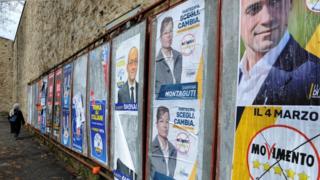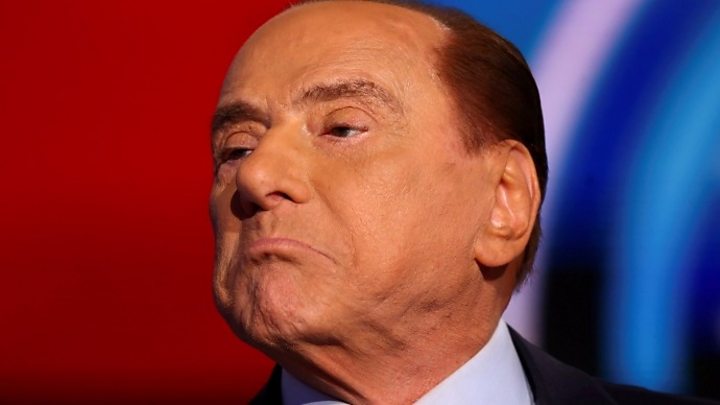Italy election: Populist surge prompts political deadlock
 Image copyright
Getty Images
Image copyright
Getty Images
Italy is on course for a hung parliament after voters backed right-wing and populist parties, projections based on partial results suggest.
The Eurosceptic, anti-establishment Five Star Movement has won the lion's share of the vote.
But ex-PM Silvio Berlusconi's right-wing coalition, which includes the far-right League, looks set to win the most seats in the lower house of parliament.
Forming a government may now take weeks of negotiation and coalition-building.
Alternatively, fresh elections could be held in a bid to produce a more decisive result - though there is no guarantee that would happen.
Provisional results show Five Star garnering 31.6% of the vote, while the League received 18.2% of the vote and Silvio Berlusconi's Forza Italia 13.8%.
Matteo Renzi's ruling Democratic Party (DP) only got 19.1% of the vote, which La Repubblica newspaper says is a psychological blow to the party, as it has failed to win more than a fifth of the votes.
Broadly, support for the League came from votes in the north, while Five Star saw its strongest show of support in the south of the country.
What does the result mean?
Italian daily newspaper Il Fatto Quotidiano is running a front-page headline saying simply: "Everything will change."
Though no party will be able to rule alone based on the early poll figures, the surge of support for populist outfits has been compared with Brexit and the election of Donald Trump in the US.
Mr Berlusconi's coalition is tipped to get 248-268 seats - below the 316 needed for a majority.
Founded in 2009 by comedian Beppe Grillo, who denounced cronyism in Italian politics, Five Star made significant gains and could emerge as the largest single party in Italy's lower house, with 216-236 seats.
Public anger over unemployment and immigration appears to have battered Mr Renzi's DP, and its centre-left coalition is projected to come a distant third, with an estimated 107-127 seats.
"It is clear to us that this is a blatant and clear defeat," said Agriculture Minister Maurizio Martina.
Final confirmed results are not expected for several hours.
BBC Europe editor Katya Adler tweeted that it is "theoretically possible for the EU's nightmare result to come true: a coalition between the 'populist Eurosceptics': Five Star and Lega [the League party]".
Voting for Italy's Senate, the upper house of parliament, also favoured populists and parties of the right. Five Star performed better than anticipated, with figures based on early vote-counting suggesting it will take the most seats - around 102-122 - but miss out on a majority.
The right-wing coalition is predicted to get 118-150 seats in the upper house, and the Democratic Party 42-54.
| Where they stand | |||
|---|---|---|---|
| Parties/coalitions | Migration | Europe | Economy |
| Centre-right | Deport illegal migrants, take control of borders, Marshall Plan for Africa | Revise treaties, refuse overregulation, no more austerity policies from Europe, protect "Made in Italy" products | Facilitate credit lines for small- and medium-sized enterprises, help young people access labour market |
| Democratic Party | No to Dublin regulation, stop aid for countries refusing to share burden | More European political and social integration | Reduce unemployment to under 9%, youth unemployment below 22%, guaranteed minimum wage, equal pay for women |
| Five Star Movement | Revise Dublin regulation, distribute asylum seekers across EU | Find alternatives to the euro, strike alliances with Southern European countries, oppose austerity policies, protect "Made in Italy" products | Free trade union representation, worker participation in decision-making, shorten working day, incentivise part-time work |
Advantage Five Star - but what happens next?
By James Reynolds, BBC News, Milan
In Italy, the public vote is merely the first stage in a very long process of picking a new government - which is why party leaders here do not jump in front of the cameras in the hours after the polls close.
We still don't know who the winner will be. But in this opening act, Five Star has gained a certain advantage. Its message clearly resonated with young people searching for jobs, and with voters in the poorer south of the country.
The movement made a big point of running alone in this election. By contrast, other major parties teamed up into electoral alliances. But the feature which gave the party its strength - its independence - may now become its weakness. In order to form a government, Five Star must find coalition partners. Its inexperience in working with others may be a disadvantage in the practical business of coalition-building.
So, which way will Five Star seek to turn? There is some speculation that the movement may seek a coalition with the anti-immigration League party, which appears to have performed better than its own alliance partners in this election.
Five Star and the League have each criticised Italy's relationship with the European Union, although neither campaigns to leave the bloc. A potential alliance between the two would be viewed with some degree of worry in Brussels.
Berlusconi's party outshone by allies
The bloc backed by Mr Berlusconi includes his Forza Italia (Go Italy!) party, plus anti-immigrant League, and the far-right Brothers of Italy.
Mr Berlusconi, 81, cannot hold public office himself until next year because of a tax fraud conviction.
And in a personal blow for him, Forza Italia looks likely to have been outdone by its ally, the League.
"My first words: THANK YOU," tweeted League leader Matteo Salvini as projections rolled in.
Four-time prime minister Mr Berlusconi has backed European Parliament President Antonio Tajani as his choice to lead the country.
However, it is possible Mr Salvini - who has promised to deport hundreds of thousands of migrants and spoken of the "danger" of Islam - will now be eyeing the job.
How was the turnout?
Officials estimated voter turnout at more than 58% on Sunday evening, with several hours of voting still to go.
Long queues were seen at voting centres around the country, with residents in Rome asked to turn up well before polls closed at 23:00 (22:00 GMT) to make sure they had time to cast their ballots.
The delays are thought to have been caused by a new voting system and new in-depth, anti-fraud checks.
In Palermo, Sicily, 200,000 ballots had to be reprinted because of errors, which led to a delay in some polls opening.
What are the key issues?
Immigration
More than 600,000 migrants have made the treacherous journey from Libya across the Mediterranean to reach Italy since 2013.
The huge number of arrivals has upset many Italians - with politicians, including from the mainstream, toughening their rhetoric as a result.
Mr Berlusconi has called the presence of illegal migrants a "social time-bomb" and pledges mass deportations.
The campaign has seen violent clashes between far-right supporters and anti-fascist protesters.
The economy
Italy's economy has started to expand once again. But nearly 10 years on from the global financial crisis, Italy's gross domestic product - or total economic output - remains 5.7% lower than pre-crisis levels.
In 2016, some 18 million people were at risk of poverty, and unemployment is at 11%.
Economic policy has been a key battleground, but observers say they have heard more from parties about pensioners than youths, which could be due to young voters' high vote abstention rates.

More on Italy's vote:
- Italian town at centre of bitter race debate
- Will fake claims affect poll?
- Silvio Berlusconi: Italy's perpetual powerbroker